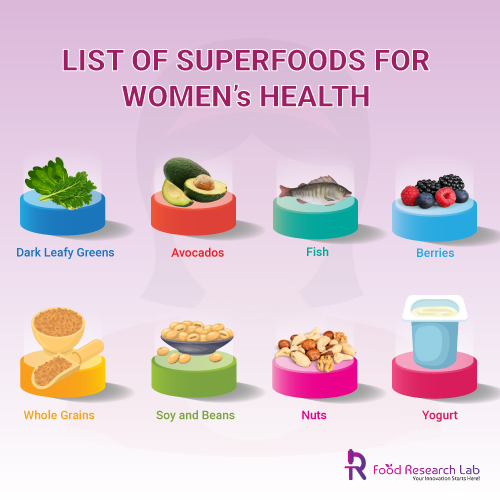Functional Foods for Overalls Women’s Health
Healthy meals offer you the nutrients you want to sustain your body’s health and energy levels. The functional food product development sector market is soaring in demand. The major components that make up a healthy, balanced diet include water, carbs, fat, protein, vitamins, and minerals.
- Sugar: Women should aim for 25 grammes (6 teaspoons) or less daily.
- Fat: has roughly nine calories per gramme, so limit yourself to about 50 g per day.
- Sodium: Women should not exceed 1,500 mg (3.8 g) of sodium per day.
- Protein: Women who exercise for less than 30 minutes per day should consume 46 grammes of protein.
- Vitamins: While naturally occurring vitamins are optimal, supplementing with vitamins can also be beneficial.
- Calories: A 150-pound woman needs 2,000 calories per day to maintain her weight and 1,500 calories per day to lose weight.

What Should Women Eat to Maintain Their Health?
A healthy eating plan includes all of your body’s nutrients regularly and any non-nutritive additions. Dietary supplements are also another way to keep your body away from nutrition deficits. Following is a list of foods that make up a healthy, well-balanced diet:
- Vegetables and their subgroups include beans, peas, grains, and dark green, red, or orange-coloured vegetables.
- Fruits in their natural state
- Quinoa, corn, millet, and brown rice are examples of whole grains.
- Full-fat dairy is in short supply.
- Lean meats, eggs, nuts, seeds, and soy products are all good protein sources.
- Olive, flaxseed, canola, and avocado oils are healthy oils.
Only around a quarter of the population consumes the recommended quantities of fruits, vegetables, dairy, and oils. Over half of the people, on the other hand, meets or exceeds the total grains and protein guidelines.
You should only consume whole grains that contain full-grain kernel, bran, and germ while eating grains. The germ & bran have been detached from refined grains (or processed grains), iron, dietary fibre, and other important minerals.
Vitamins for Women’s Preventative Health
It is advised that you include the following elements in your vitamins or include them in your regular functional food for health benefits:
Calcium: A high-calcium diet may reduce the incidence of osteoporosis in women.
Iron: Women lose iron with each menstrual cycle. The Recommended Dietary Allowance (RDA) for premenopausal women is 18 mg of iron per day.
Omega-3 fatty acids are essential fatty acids that help the body function properly. As women become older, their oestrogen levels drop, increasing their risk of heart disease. These fatty acids can benefit your body battle inflammation.
As you continue your quest for unhealthy meals masquerading as healthy, the terms “processed,” “calories,” and “sugar” should now be triggers for you. Lowering your sugar intake will help you maintain a healthy weight while also lowering your risk of some malignancies, reducing the number of blood sugar level spikes (which may be causing your energy and mood fluctuations), and reducing the severity of menopausal symptoms.
As you enter the perimenopausal and menopausal stages of your life, it’s critical to consider health choices. Remember to read your labels carefully, remember that the healthiest options don’t have an ingredient list and know that the health benefits of functional foods don’t always become apparent in the packaging. Food Research Lab can help you in food formulation and development of food products for overall women’s health.

Comments
Post a Comment